Special Report
The Next 14 States to Legalize Marijuana
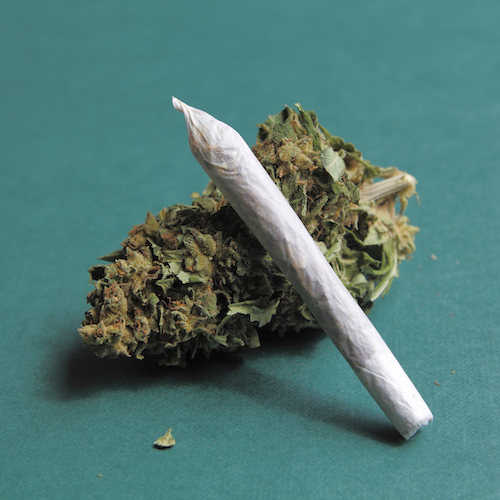
Published:
Last Updated:

In 2013, only 7% of American adults said they were marijuana users. Today, less than three years later, usage rates have nearly doubled, as 13% of U.S. adults say they smoke pot — according to a recent Gallup poll. Despite what appears to be growing acceptance of the drug, the DEA recently reiterated marijuana’s classification as a Schedule 1 substance, in the same category as heroin, LSD, and ecstasy.
Reflecting the increasing acceptance of the drug, and in direct conflict with the DEA’s conclusion, some states have dialed down their marijuana laws in recent years. Prohibited across the country less than five years ago, marijuana is now legal and regulated in Alaska, Colorado, Oregon, Washington, and the District of Columbia. While it may be too early to gauge the social and economic impact of full scale legalization in these places, more than a dozen other states could foreseeably repeal marijuana prohibition in the coming years.
[in-text-ad]
24/7 Wall St. revisited last year’s list of states most likely to legalize recreational marijuana. We again reviewed current marijuana laws as well as legislative processes in each state. The path to legalization is long, complex, and often very different in each state. Changing circumstances led to the addition of several states, including Arizona and Illinois, while Minnesota was the only state on last year’s list that was not included this year.
Click here to see the 14 next states to legalize pot.
A state’s legislative process is an important factor in the state’s path towards legalization of marijuana. In an interview with 24/7 Wall St., Morgan Fox, senior communications manager with Marijuana Policy Project, a marijuana legalization advocacy group, explained, “Traditionally, voters have been far ahead of politicians when it comes to supporting marijuana policy reform.” As a result, states that allow ballot initiatives, through which statutes and constitutional amendments can be proposed by voters, are more likely to legalize marijuana sooner than states that do not allow ballot initiatives.
The four states that have legalized recreational marijuana use have done so through ballot initiatives. And this November, voters in Arizona, California, Maine, Massachusetts, and Nevada will also vote on ballot initiatives that would repeal prohibition of the drug.
However, just over half of states do not allow such ballot initiatives, and many lawmakers perceive marijuana reform as too politically risky. According to Fox, this is beginning to change. In many states, including Vermont and Rhode Island, voters are not likely to punish politicians for being perceived as soft on drugs if they are in favor of marijuana law reforms. In states such as these, possession of a small amount of pot is already decriminalized and marijuana use is legal for those with certain medical conditions.
Relatively high usage rates among voting-age adults in these states also suggest a tolerant attitude towards the drug. In Vermont, for example, more than one in five adults have used marijuana in the past year, the second highest rate in the country.
While not a critical step towards full-scale legalization, states that allow marijuana use for medical reasons are also more likely to repeal prohibition. Not only does legal medicinal use reflect a relatively tolerant attitude towards the drug, but also it can help voters better understand the issue. “One of the potential benefits of having a functional medical marijuana program is that voters are able to see what a regulated marijuana industry looks like,” Fox said. This in turn can help people “envision what it would look like under a legalized system.”
Marijuana legalization is hotly debated, and states that have legalized the drug’s recreational use have gone about it in different ways. In Colorado, the campaign that eventually led to legalization argued for marijuana as a safe alternative to alcohol. By contrast, in Washington, advocates argued marijuana should be legalized because it is not safe and therefore should be regulated. They argued further that processing the numerous marijuana cases was an unnecessary burden on the justice system.
To determine the next states most likely to legalize recreational marijuana, 24/7 Wall St. reviewed existing marijuana laws in each state. To be considered, a state needed to have already legalized medicinal marijuana. Of those 25 states, a state needed to have either decriminalized possession of small amounts of pot, or allow ballot initiatives that can lead to legalization. Only 14 states met these criteria. State marijuana laws came from the National Organization for the Reform of Marijuana Laws, and marijuana use and perceptions of risk came from the Substance Abuse and Mental Health Services Administration. In states that have not decriminalized marijuana, maximum fines are listed for the smallest amount penalized for first-time offenders.
These are the next states to legalize marijuana.
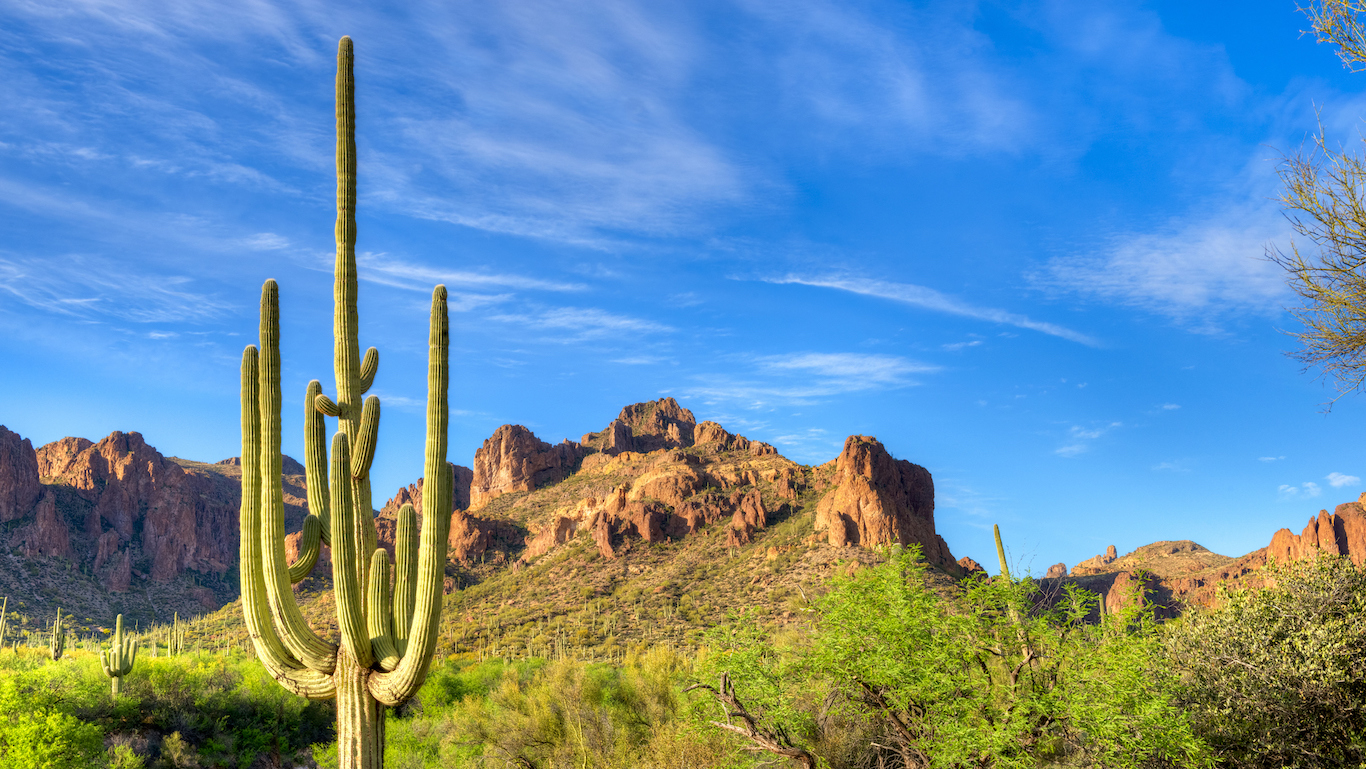
1. Arizona
> Possession decriminalized: No
> Amount decriminalized: N/A
> Max. fine for less than 2 lbs: $150,000
> Pct. adults using in past year: 13.5%
Currently, penalties for marijuana possession in Arizona are among the most severe in the country. Arizona is the only state where a person possessing any amount of marijuana can face felony charges. In addition, possession can lead to a two-year prison sentence and up to a $150,000 fine.
Despite the draconian laws, Arizona may well be the next state to legalize recreational marijuana. State voters submitted more than enough petition signatures to the Secretary of State in late June to include a measure on the ballot in November to end marijuana prohibition and effectively regulate the drug like alcohol. If passed, the provision would allow adults 21 and older to possess up to an ounce of marijuana. A report released by the state’s Joint Legislative Budget Committee estimates that legalizing marijuana would generate $82 million in additional tax revenue annually.
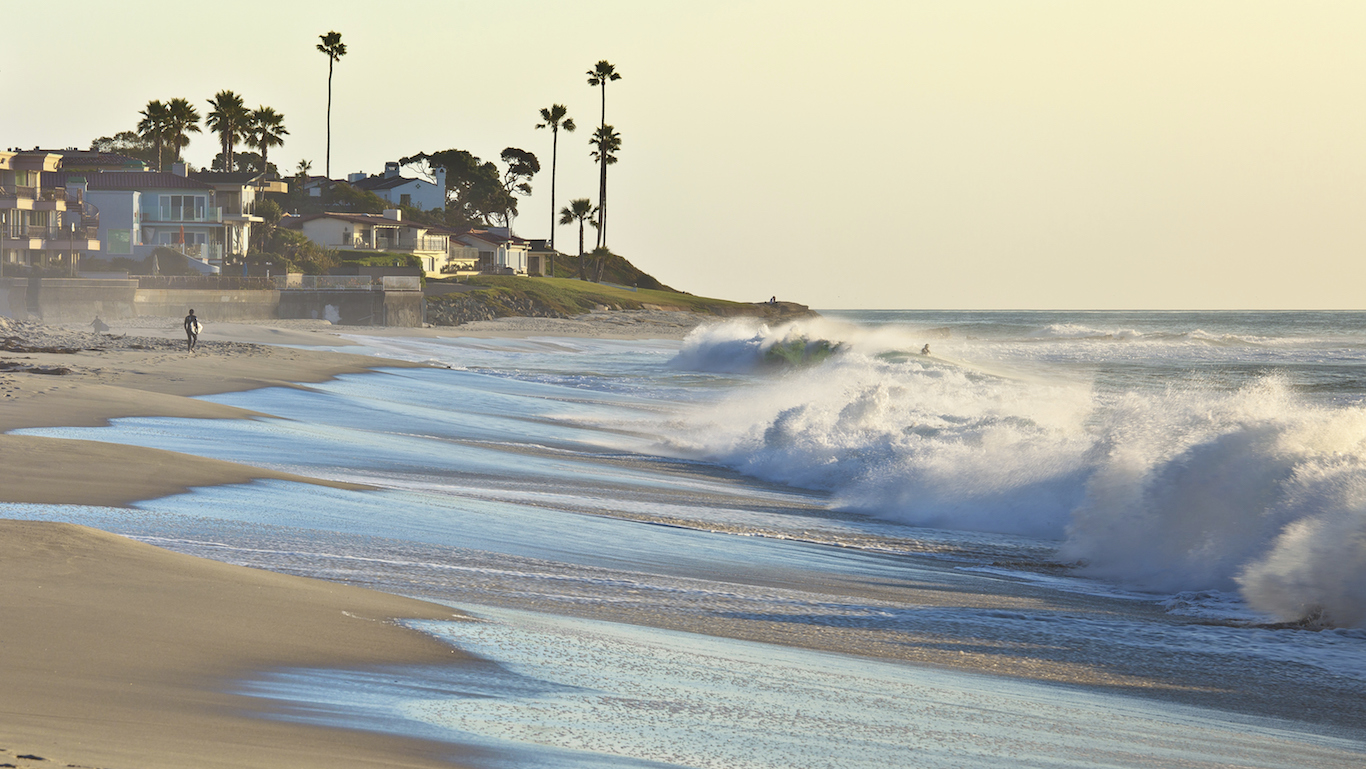
2. California
> Possession decriminalized: Yes
> Amount decriminalized: 28.5 g or less
> Max. fine for 28.5 g or less: $100
> Pct. adults using in past year: 14.4%
California voters have said no to legalizing recreational marijuana use multiple times. First in 1972, and again, by a much slimmer margin, in 2010. This year may be different, however. California is one of five ballot initiative states where voters will be given the opportunity to overturn marijuana prohibition. Proposition 64, commonly referred to as the Adult Use of Marijuana Act, would legalize, regulate, and tax marijuana. Proponents say the proposition will save state and local governments tens of millions of dollars in enforcement of marijuana laws and potentially bring in more than a billion dollars in additional tax revenue annually. One recent poll suggests Proposition 64 will easily pass.
[in-text-ad]
Despite some early defeats for marijuana reform groups, the state has historically had a relatively progressive attitude towards pot. State residents voted to legalize medical marijuana in 1996, and in October 2010, then Gov. Arnold Schwarzenegger decriminalized possession of less than an ounce of marijuana.
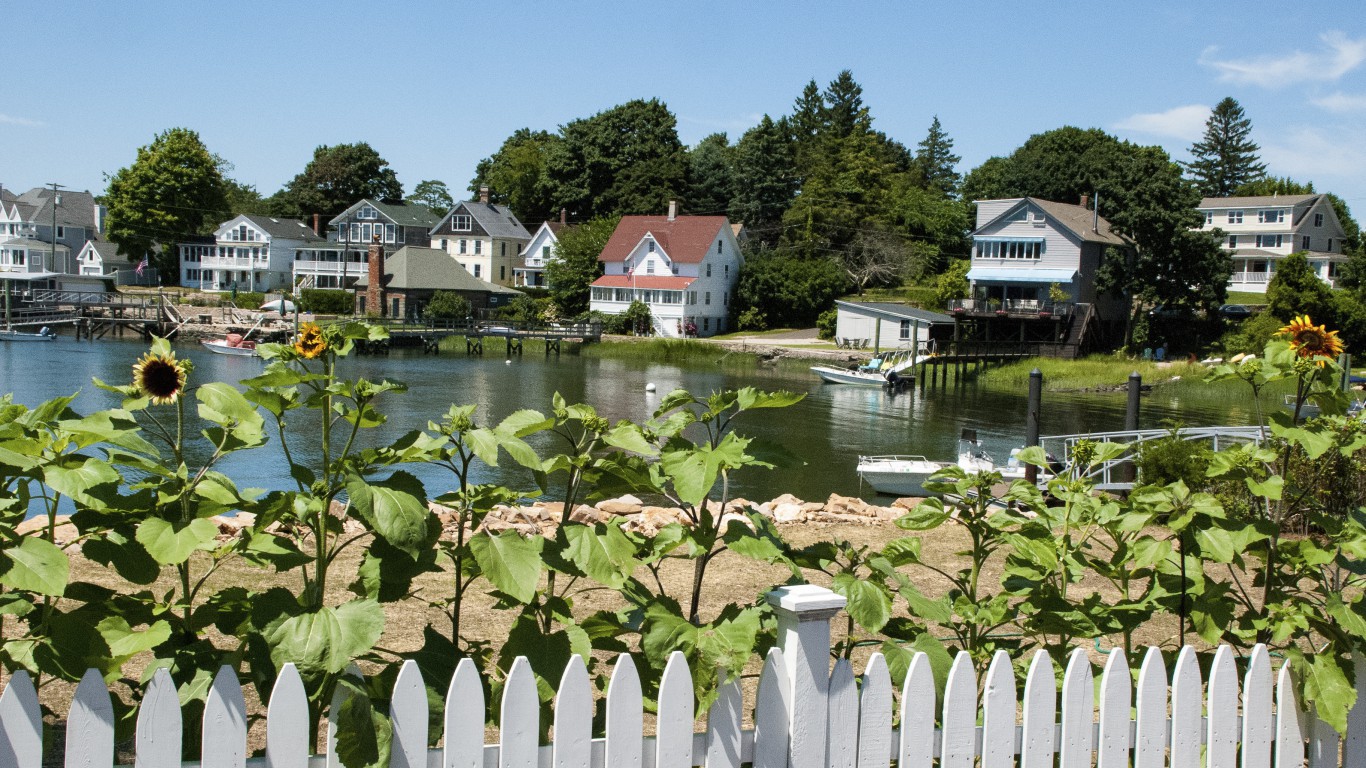
3. Connecticut
> Possession decriminalized: Yes
> Amount decriminalized: Less than 1/2 oz
> Max. fine for less than 1/2 oz: $150
> Pct. adults using in past year: 13.8%
A group of Connecticut state representatives introduced in February 2016 House Bill 5236. If passed, the bill would legalize, regulate, and tax retail marijuana sales. While the bill is not expected to pass this year, Connecticut could potentially be the first non-ballot initiative state in the country to legalize recreational marijuana use.
Connecticut’s existing marijuana laws are among the most progressive in the country. Since 2011, individuals caught with less than half an ounce of pot, including repeat offenders, have not faced criminal charges or jail time. Like close to half of all states, Connecticut allows medical marijuana use for patients with certain conditions.
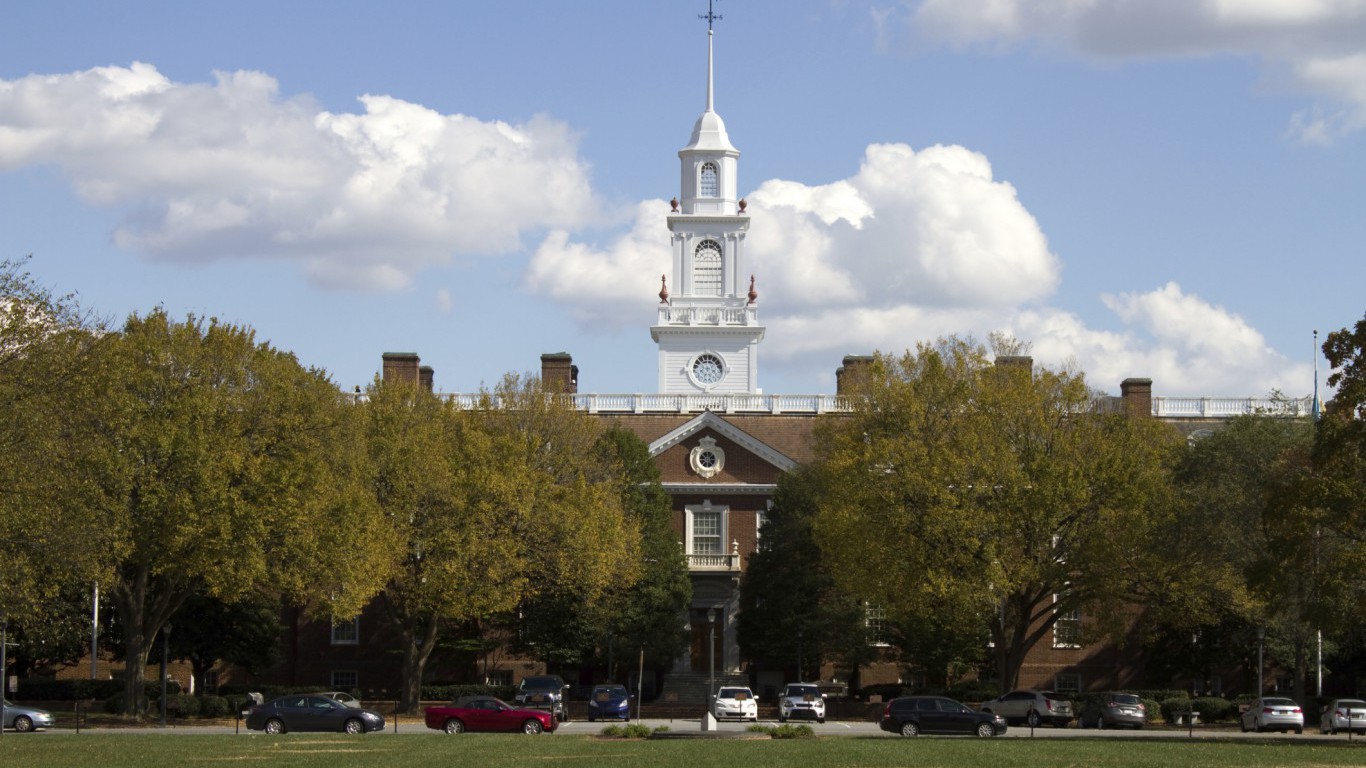
4. Delaware
> Possession decriminalized: Yes
> Amount decriminalized: Up to 1 oz
> Max. fine for up to 1 oz: $100
> Pct. adults using in past year: 13.9%
Delaware Governor Jack Markell signed in June of last year a bill decriminalizing the possession of up to 1 ounce of marijuana. The law took effect in December, marking a major milestone in the state’s path towards legalization of the drug.
[in-text-ad]
Markell has in the past publicly opposed full legalization, however. His gubernatorial term ends next January. Of the three candidates running for the office, Republican Colin Bonini supports legalizing, while Republican Lacey Lafferty strongly opposes the drug, and Democratic frontrunner John Carney is undecided on the issue. Currently, possession of up to 1 ounce of marijuana is punishable by a maximum fine of $100.
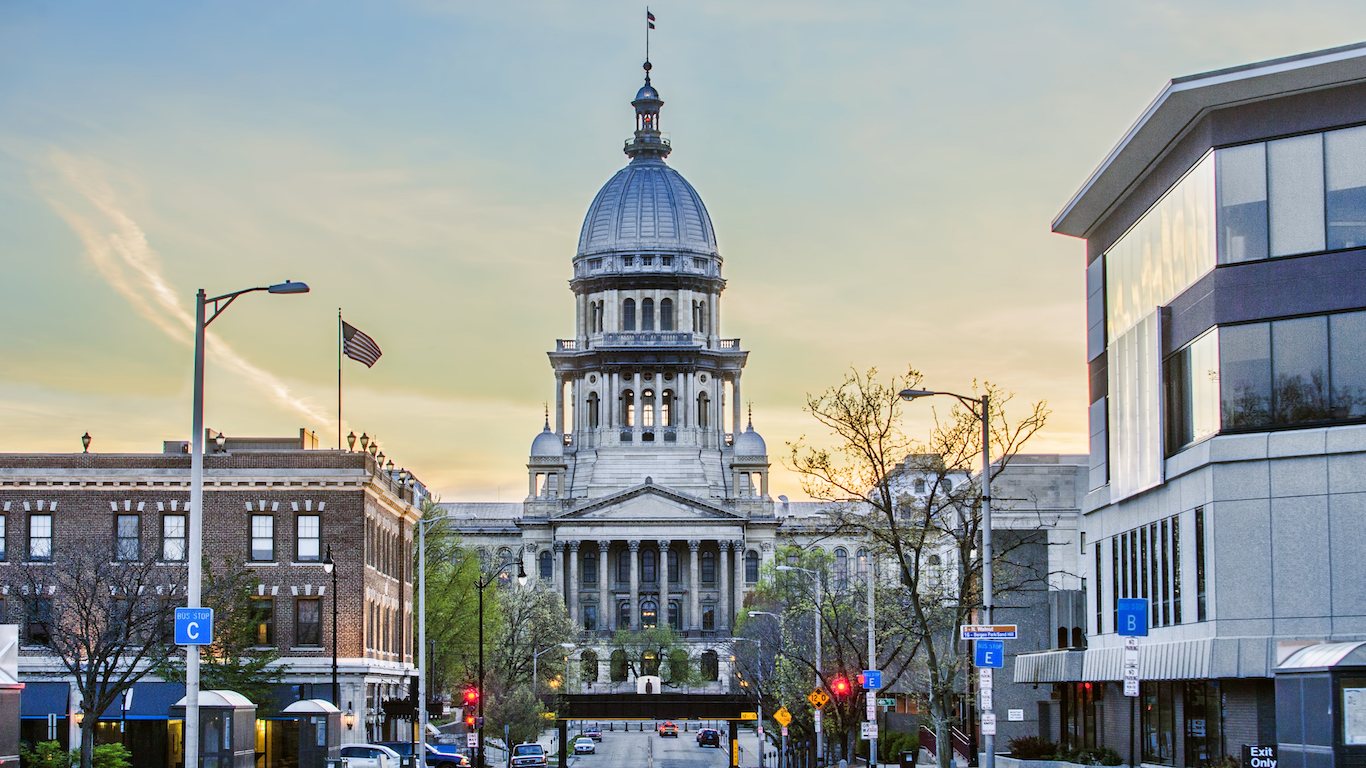
5. Illinois
> Possession decriminalized: Yes
> Amount decriminalized: 10 g or less
> Max. fine for 10 g or less: $200
> Pct. adults using in past year: 12.2%
Illinois is one of the most recent additions to the growing list of states to decriminalize possession of small amounts of marijuana. Gov. Bruce Rauner signed in July 2016 Senate Bill 2228 into law, removing criminal charges and jail time for anyone caught with 10 grams of pot or less. Earlier in the summer, Rauner expanded the state’s medical marijuana program to include post-traumatic stress disorder as a qualifying condition.
In addition to relatively progressive existing laws, Illinois is also a ballot initiative state, which makes marijuana legalization even more likely. Because it can be a risky political move to support marijuana legalization, elected officials often shy away from the subject. However, in ballot initiative states residents can put forth such initiatives. In fact, recreational marijuana use is legal only in such states. With enough documented public support, Illinois voters can also put recreational marijuana use on the ballot.
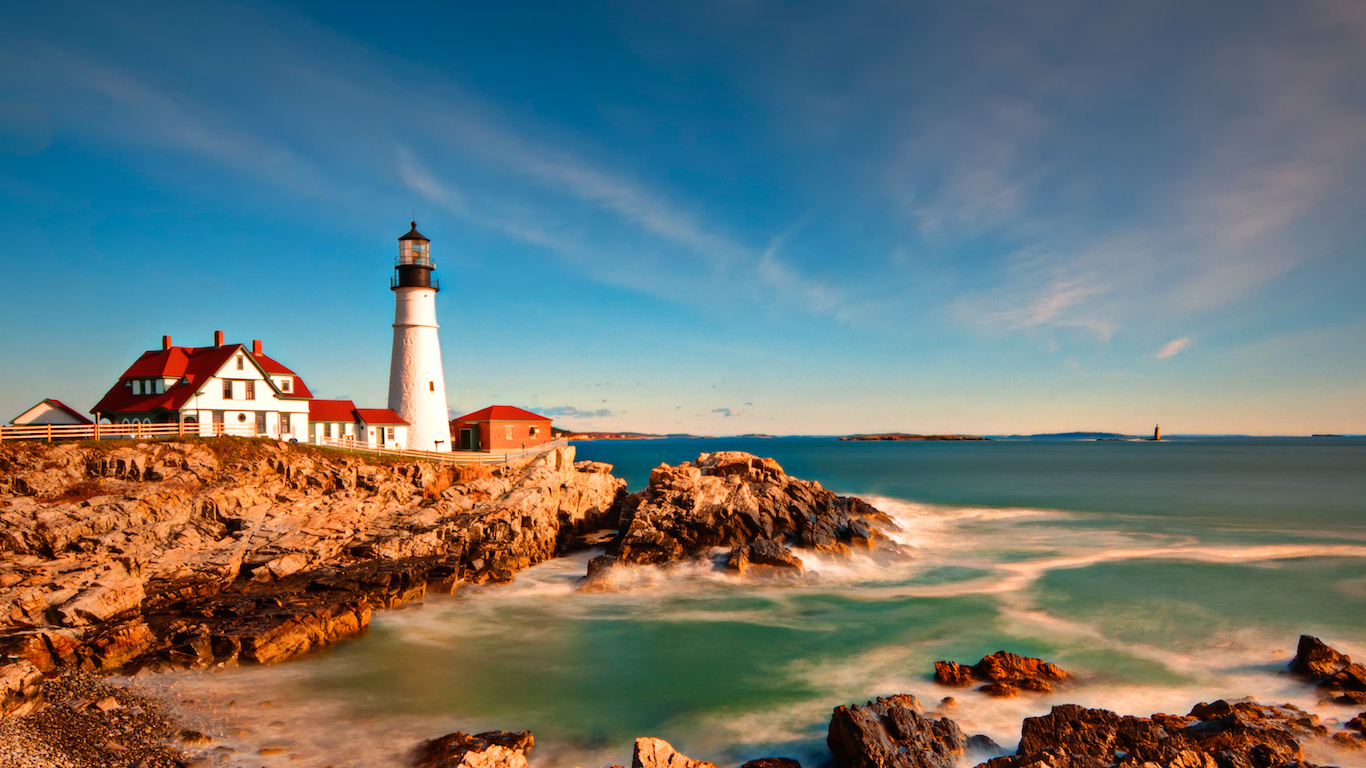
6. Maine
> Possession decriminalized: Yes
> Amount decriminalized: 1.25 oz or less
> Max. fine for 1.25 oz or less: $600
> Pct. adults using in past year: 19.8%
Historically, Maine has been among the states leading the campaign for marijuana reform. Possession of small amounts of pot has been decriminalized in the state since the mid 1970s, and Maine voters legalized the drug’s medicinal use in 1999. In November 2014, Portland became the first city on the East Coast to legalize recreational marijuana use. City voters overwhelmingly passed a law allowing adults 21 and over to possess up to 2.5 ounces of marijuana. Voters statewide will have the opportunity to pass a similar law for the rest of the state in November 2016. Legalization proponents argue that ending prohibition will make communities across the state safer and raise millions of dollars in tax revenue.
[in-text-ad]
As in many other states potentially on the brink of legalizing, marijuana use is relatively common in Maine. Nearly one in five adults in the state have used marijuana in the past year, a larger share than in all but three other states.
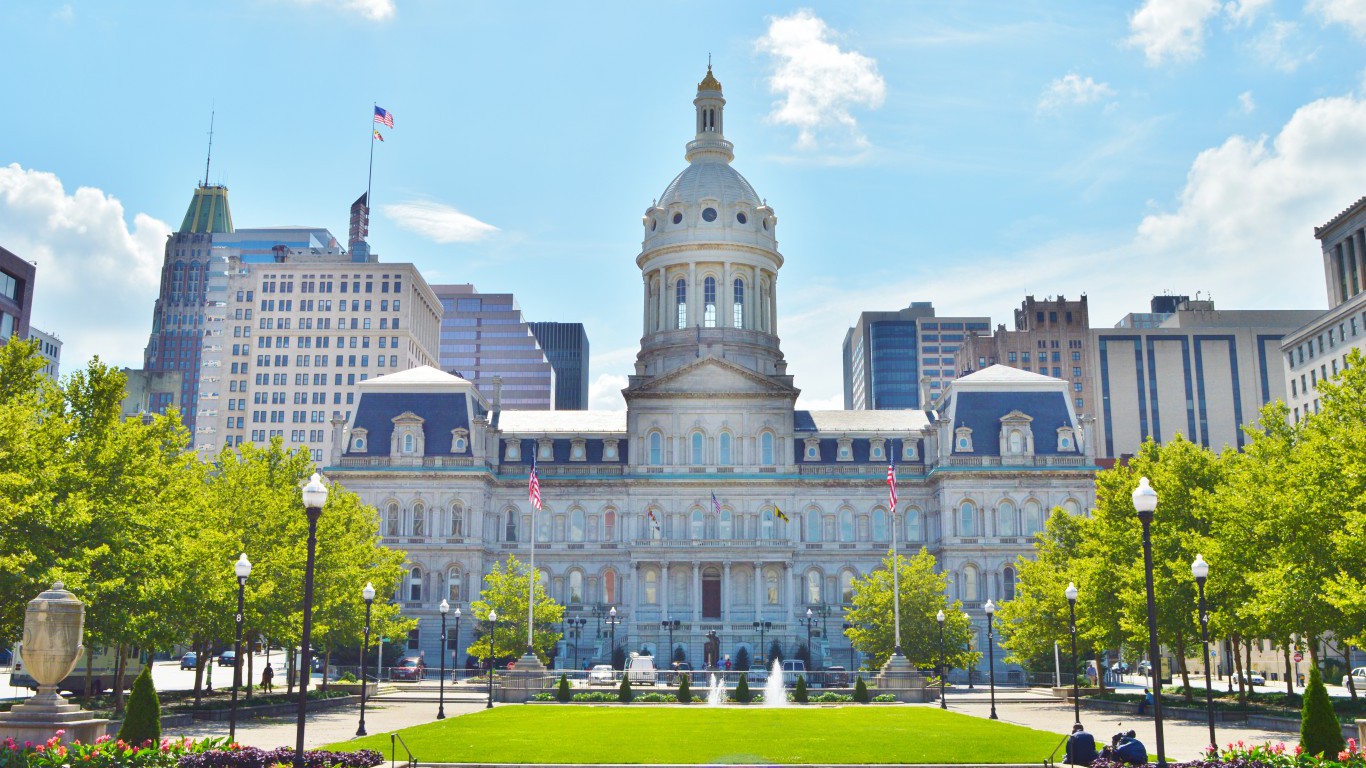
7. Maryland
> Possession decriminalized: Yes
> Amount decriminalized: Less than 10 g
> Max. fine for less than 10 g: $100
> Pct. adults using in past year: 13.3%
Former Maryland Gov. Martin O’Malley signed in 2014 legislation removing the criminal penalties for possessing small amounts of marijuana. Despite Governor Larry Hogan vetoing the bill, Maryland legislature fully decriminalized marijuana possession, including paraphernalia, in February 2016. Currently, the maximum fine for the possession of up to 10 grams of marijuana in the state is $100.
Another bill was introduced in February to the state legislature, but did not pass the Maryland General Assembly. The bill would have made the use, possession, and cultivation of marijuana a constitutional right in Maryland. The most recent poll of state residents shows that 54% of Marylanders support the legalization and regulation of marijuana.
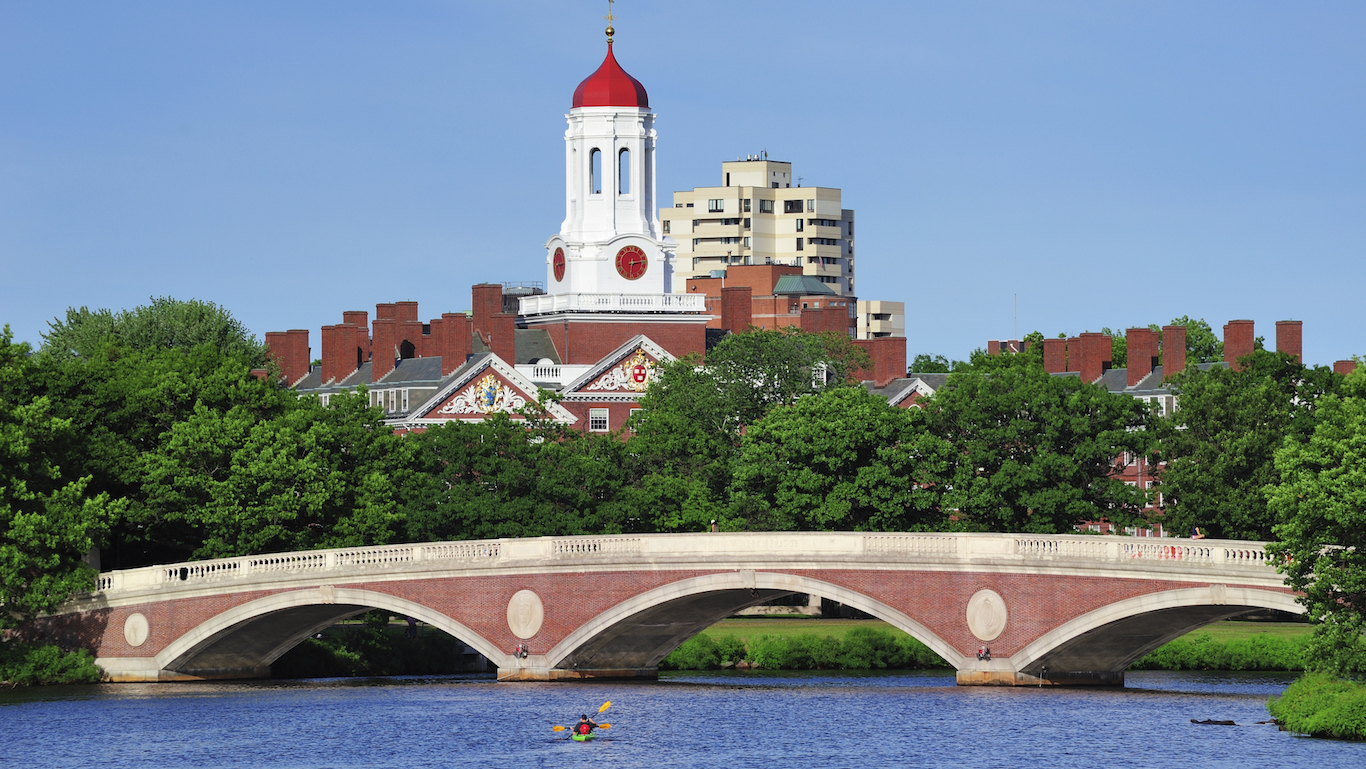
8. Massachusetts
> Possession decriminalized: Yes
> Amount decriminalized: 1 oz or less
> Max. fine for 1 oz or less: $100
> Pct. adults using in past year: 17.4%
Through a ballot initiative, voters will have an opportunity to legalize recreational marijuana use in Massachusetts this November. The initiative, known as Question 4, would tax and regulate marijuana sales and use in the Bay State. Proponents of legalization in the state argue that an end to prohibition will unclog the state’s justice system, bring in at least $100 million in tax revenue, and put a dent in the state’s opioid addiction epidemic.
[in-text-ad]
Voters in Massachusetts are far less likely than most Americans to perceive marijuana use as inherently risky. Only 19.7% of adults in the state associate great risk with monthly pot use, a considerably smaller share than the 27.8% of Americans 18 and older.
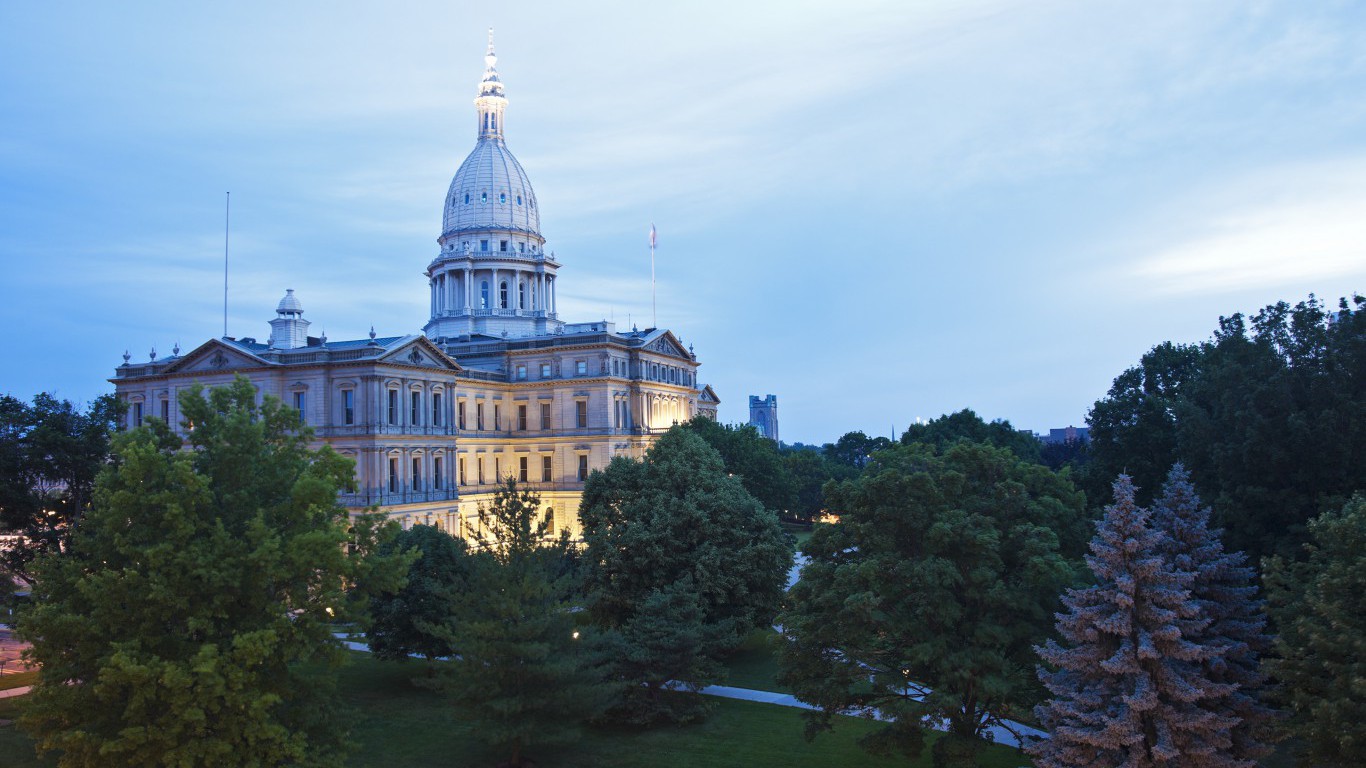
9. Michigan
> Possession decriminalized: No
> Amount decriminalized: N/A
> Max. fine for any amount: $2,000
> Pct. adults using in past year: 15.7%
In 1967, poet and activist John Sinclair was arrested and sentenced to 10 years in a Michigan prison for giving two marijuana joints to an undercover police officer. The sentencing led to protest and controversy, and in 1972 Ann Arbor became the first city in the state to decriminalize marijuana. While the state has yet to decriminalize the drug, 16 cities in Michigan have voted to reduce penalties under state law for possession. Currently, the maximum penalty across the state for possession of marijuana is one year in jail and up to a $2,000 fine.
In September of last year, Rep. Jeff Irwin introduced a bill that would legalize recreational marijuana use in Michigan. As of the writing of this article, the bill has yet to pass either the House or the Senate.

10. Montana
> Possession decriminalized: No
> Amount decriminalized: N/A
> Max. fine for 60 g or less: $500
> Pct. adults using in past year: 14.1%
Existing penalties for marijuana possession are relatively harsh in Montana. First time offenders caught with any amount less than 60 grams can face misdemeanor charges, a $500 fine, and up to six months in jail.
[in-text-ad]
Two initiatives aimed at legalizing, regulating, and taxing marijuana in the state fell short of the number signatures required to make the ballot in November. Harsh legal penalties and failed ballot measures aside, future efforts will likely have greater success. Adults in Montana are less likely than most Americans to perceive regular marijuana use as risky behavior. Furthermore, 14.1% of Montana residents 18 and older have used marijuana in the past year, a slightly higher share than the 12.9% of American adults. In addition, medical marijuana has been legal in the state for over a decade.

11. Nevada
> Possession decriminalized: No
> Amount decriminalized: N/A
> Max. fine for 1 oz or less: $600
> Pct. adults using in past year: 12.9%
Nevada is one of five states where residents will vote this November whether to legalize marijuana or not. The ballot initiative would legalize possession of up to 1 ounce of marijuana, regulate production and sales of the drug, and establish a 15% excise tax on bulk marijuana sales. Most states voting to legalize marijuana this election have already decriminalized the drug. Nevada, on the other hand, classifies marijuana possession offenses as a misdemeanor.
Nevada legalized medical marijuana in November 2000. Over the year since the first dispensary was opened in late July of 2015, the number of medical marijuana licenses in Nevada more than doubled, growing from 9,542 to an estimated 19,974. In the most recent survey, 12.9% of adults in Nevada reported to have used marijuana in the past year, in line with the national share. If the ballot initiative passes it is highly likely that both medical and recreational marijuana use will increase in Nevada.
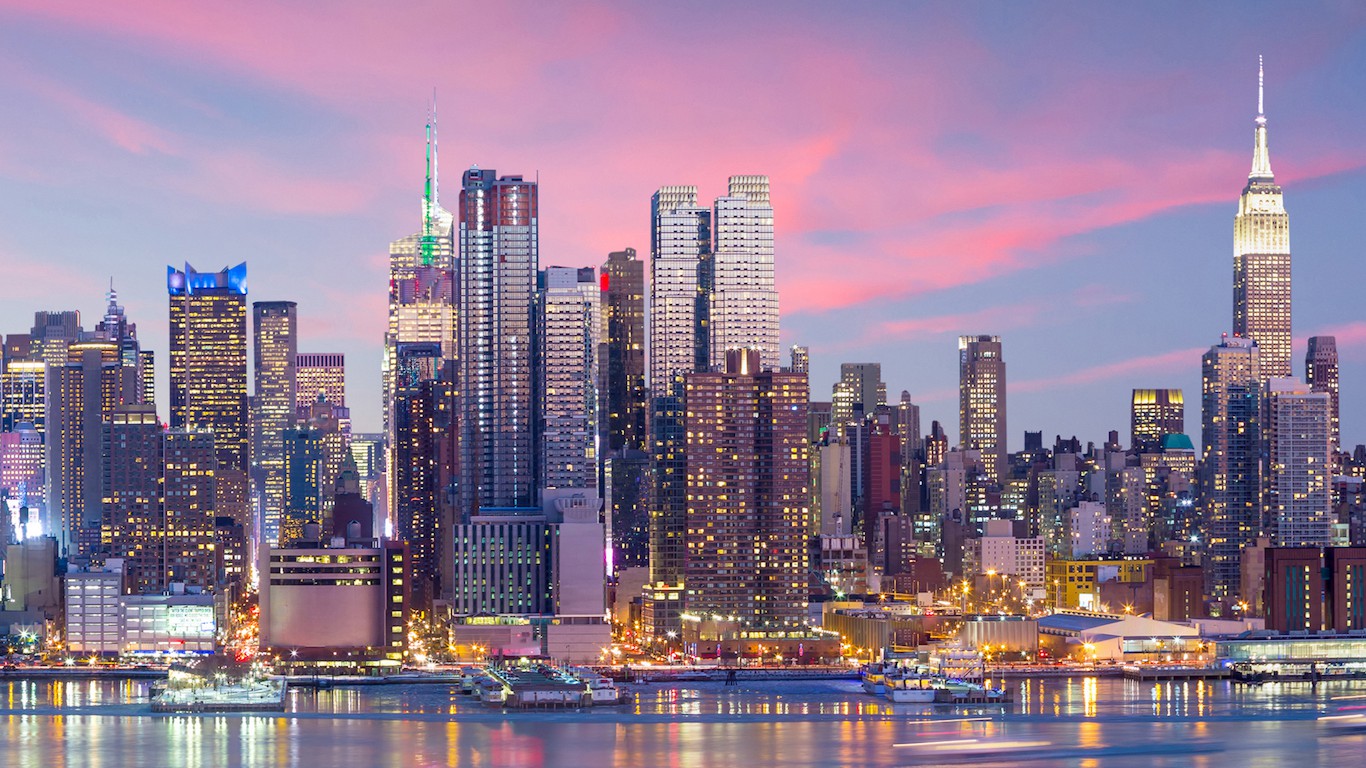
12. New York
> Possession decriminalized: Yes
> Amount decriminalized: 25 g or less
> Max. fine for 25 g or less: $100
> Pct. adults using in past year: 14.3%
In 1977, New York became one of the first states to decriminalize marijuana possession. Nevertheless, marijuana arrests are more common in New York than in any other state. In 2013, 535 out of every 100,000 New Yorkers were arrested on marijuana charges, more than twice the national rate. The arrests were largely due to violations of the state’s controversial “public view” law, which escalates the penalty for marijuana possession from a ticket to a misdemeanor if the drug is seen in public — even if revealed while emptying pockets or complying with an officer. While government surveys show white people use marijuana more often than other racial groups, 86% of New Yorkers arrested for marijuana violations in 2014 were black or Latino.
[in-text-ad]
The cost and racial disparities rooted within New York’s marijuana prohibition have led some lawmakers to push for legalization of the drug. Sen. Liz Krueger introduced in 2013 the Marijuana Regulation and Taxation Act, which aimed to legalize the production, use, and distribution of marijuana for adults in the state.
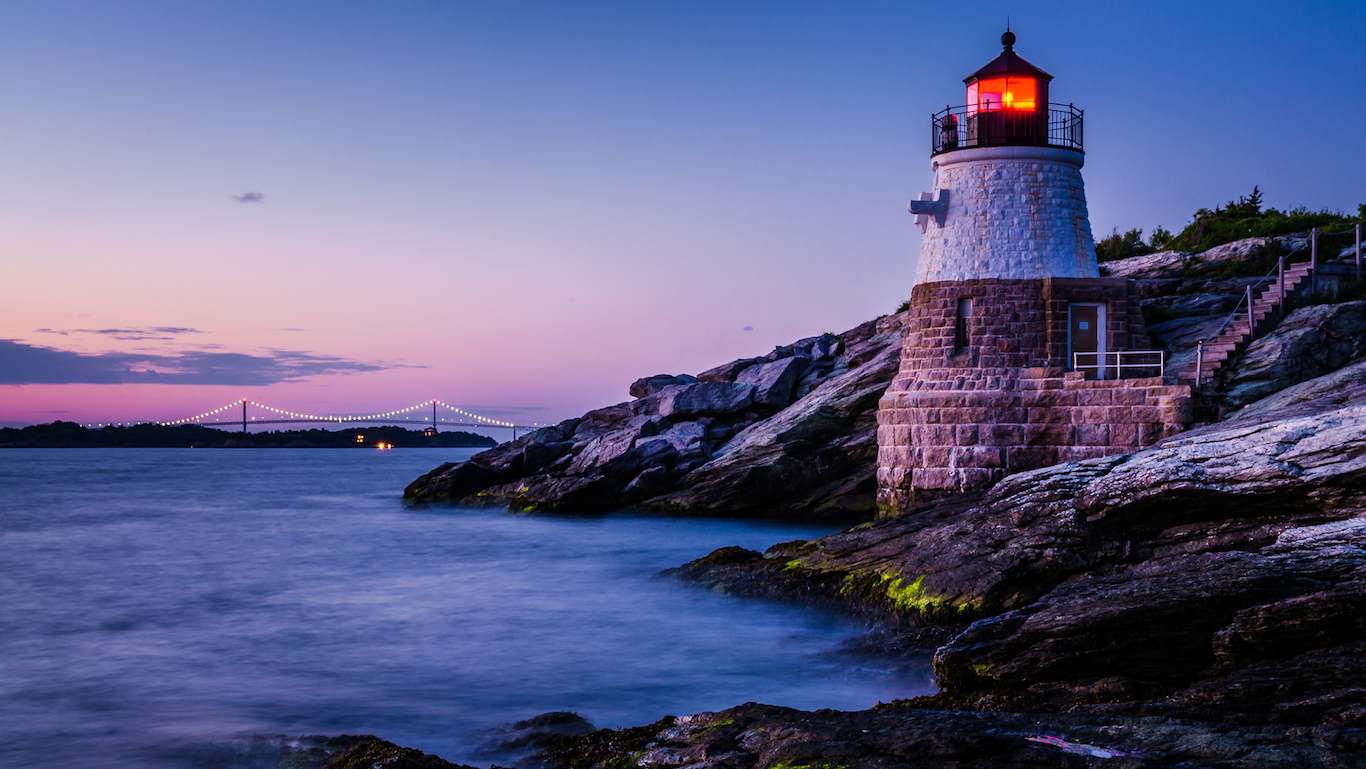
13. Rhode Island
> Possession decriminalized: Yes
> Amount decriminalized: Less than 1 oz
> Max. fine for less than 1 oz: $150
> Pct. adults using in past year: 19.1%
In its latest session, the Rhode Island legislature passed a number of reforms related to the regulation of marijuana in the state. A House bill that allows patients with post-traumatic stress disorder to qualify for medical marijuana was passed, as was a Senate bill that allows residents to grow hemp. Also, the latest budget made numerous regulatory changes to the state’s medical marijuana industry. However, the legislature did not vote on the Marijuana Regulation, Control, and Taxation Act, which would have allowed adults to possess up to 1 ounce of marijuana and grow one marijuana plant in an enclosed, locked space. At the time the bill was filed, 57% of surveyed Rhode Islanders supported legalization of the drug.
Rhode Island decriminalized marijuana in the spring of 2013. Possession of up to 1 ounce is now punishable by a maximum fine of just $150.
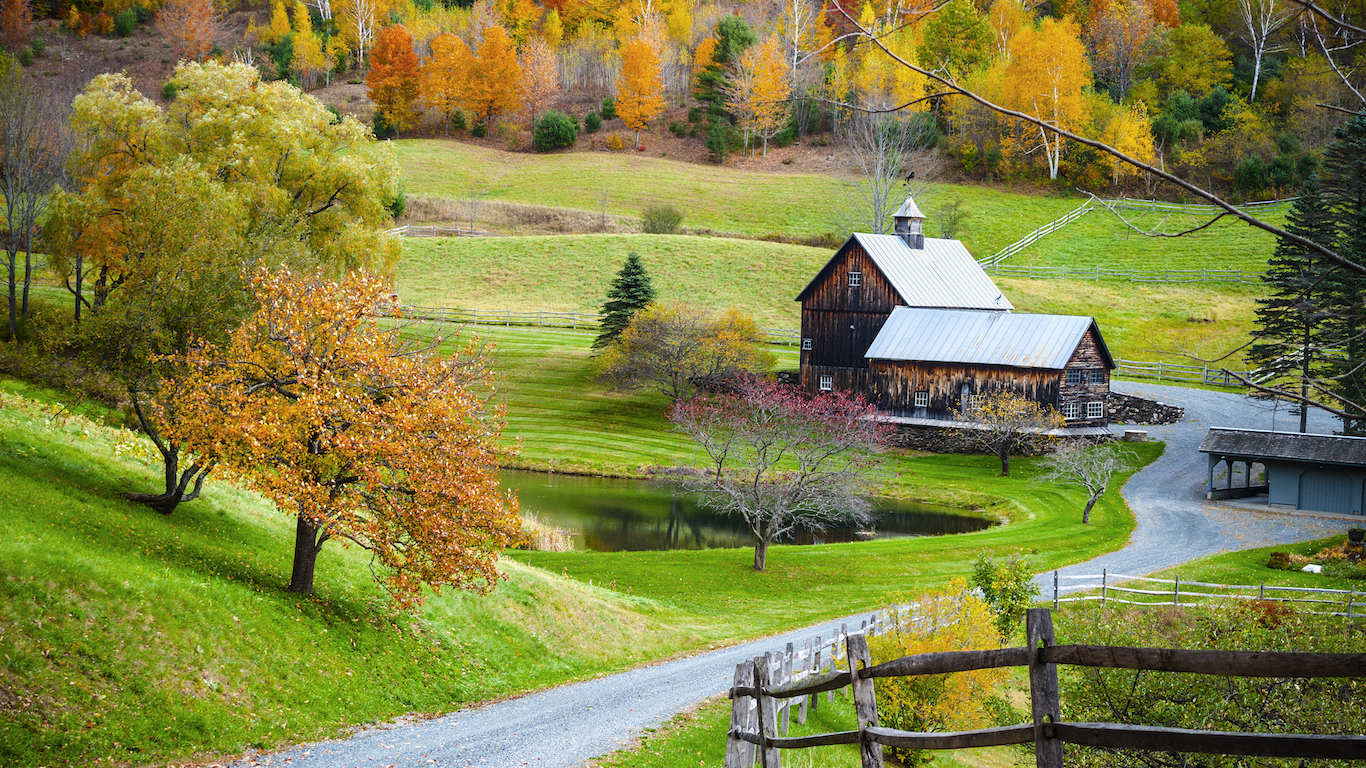
14. Vermont
> Possession decriminalized: Yes
> Amount decriminalized: 1 oz or less
> Max. fine for 1 oz or less: $200
> Pct. adults using in past year: 20.1%
In its latest session, the Vermont legislature came close to ending marijuana prohibition in the state. The Vermont Senate passed bill S. 241 to the House, where it did not receive adequate support. If the bill had passed, Vermont would have been the first state to legalize recreational marijuana use through a comprehensive legislative bill, rather than through a ballot initiative. The failure to reach a resolution may have come as a disappointment to Vermont residents, as 55% of them support legalization. More than one in five adults in the state report having used marijuana in the past year, the second highest such proportion in the country.
[in-text-ad]
The legislature did, however, pass a bill that makes obtaining medical marijuana easier. For example, it expanded the eligibility requirements for medical marijuana so that patients with glaucoma and chronic pain can qualify for the program.
Credit card companies are at war, handing out free rewards and benefits to win the best customers. A good cash back card can be worth thousands of dollars a year in free money, not to mention other perks like travel, insurance, and access to fancy lounges. See our top picks for the best credit cards today. You won’t want to miss some of these offers.
Flywheel Publishing has partnered with CardRatings for our coverage of credit card products. Flywheel Publishing and CardRatings may receive a commission from card issuers.
Thank you for reading! Have some feedback for us?
Contact the 24/7 Wall St. editorial team.